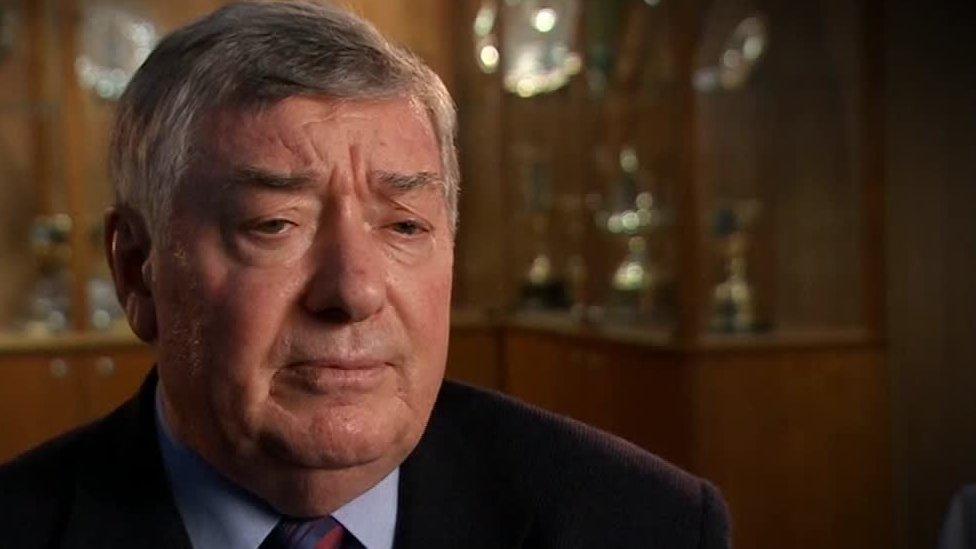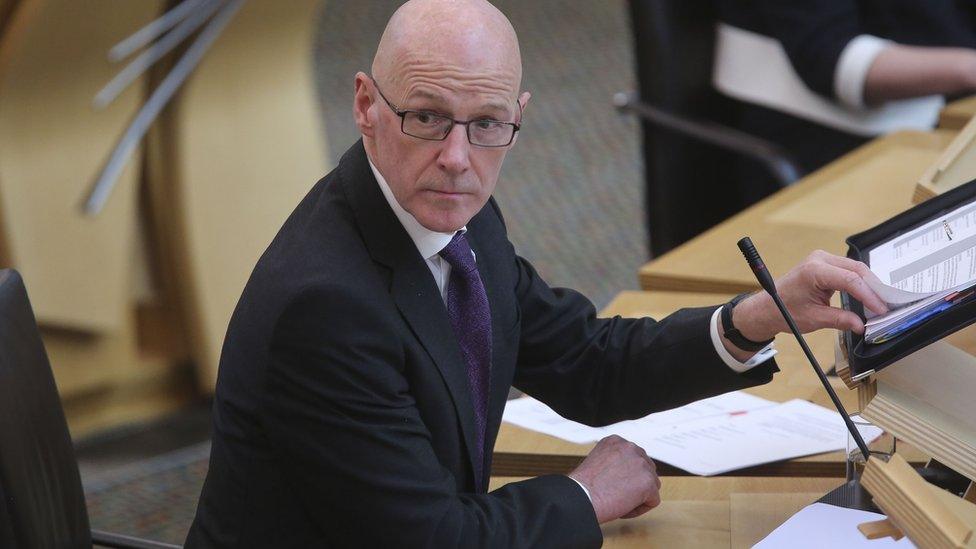Why is public service reform slow?
- Published

Campbell Christie set out a blueprint for Scottish public service reform a decade ago
Ten years after the Christie Report set out a blueprint for Scottish public service reform, even John Swinney says it's now time to make that happen.
The chief spending watchdog has joined the demands for the report to be implemented, saying there are reasons for inertia, and these need to be tackled with leadership that is more open to change and to risk-taking.
For a trade union leader who retired 23 years ago, Campbell Christie casts a long shadow.
It wasn't just the previous 22 years as general secretary of the Scottish Trades Union Congress.
That was a post that carried real, if declining, clout at the heart of "civic Scotland", as it was known. He deployed it through difficult times for trade unions with charm and integrity.
Nor is his legacy just the Falkirk football stadium built under his chairmanship of "the Bairns".
His lasting influence is in a report - the dry kind that usually gathers dust, but in his case, has had an unusually long shelf life.
This summer, "Christie" has become a rallying call for policy wonks in Scotland, marking the 10th anniversary of the publication of a report into reforming public services, external.
Campbell Christie chaired it, drawing on the input of an impressive membership and from the grassroots where people were already actively trying to improve those services.
Tragically, he died only a few weeks later.
The reason he is being discussed and cited now is, first, because his report won widespread acclamation.
But its implementation? That has fallen a long way short.
Removing obstacles
"Christie" called for more preventative spending - foreseeing future demand for public services to sort problems by intervening earlier in an attempt to avoid them happening.
That goes for early detection of health problems, and for early years initiatives in schools.
To achieve that, there was to be a focus on reduced duplication of services to improve efficiency, by integrating some of them.
It also called for empowering individuals and communities by involving them in shaping the services they want, need and deserve.
The idea was to push power down from government, and to get communities and councils working together.
These guiding principles had a lot to do with the creation of Police Scotland and the Fire and Rescue Service. It also helped shape their emphasis on prevention of crime, fire and accidents.
They can be seen in legislation giving more power to communities, and in the joint boards created to get health and social care working together.
There are tensions within the report's findings. Community involvement rarely means greater efficiency and often blocks radical moves, for instance, to rationalise hospital care or schools so that they provide better services.
And there is a clear tension between meeting current political pressures, for instance to reduce NHS waiting times, and shifting resources into early stage prevention from which the results take patience.
Better educational outcomes could be achieved by shifting resources from universities to nursery, for instance. But that meets the formidable obstacle of a cross-party commitment to free student tuition fees.
Silo thinking

Covid Recovery minister John Swinney pointed to Christie as the way for public service reform
Members of the commission, such as Professor James Mitchell of Edinburgh University, have written of the ways in which the challenges are still waiting to be tackled.
John Swinney, a senior cabinet minister through the 10 ten years and more, conceded as much in a seminar at the David Hume Institute earlier this summer.
Asked why, he said there is still too much 'silo thinking' - meaning departments and agencies that protect their role and budget rather than working in new, collaborative, innovative ways.
Having been given the cabinet responsibility for post-Covid recovery, he told the seminar he had no need to commission a new set of recommendations for how to reform services. Instead, he is telling his civil servants to read or re-read 'Christie'.
As the cabinet secretary's boss, Nicola Sturgeon, was delivering her Programme for Government this week, a blog was being published by the Auditor General for Scotland, Stephen Boyle, with some trenchant views on the failure to embrace the Christie report. It's an important article and worth a read., external
"Audit work consistently shows a major implementation gap between policy ambitions and delivery on the ground," said the leader of the spending watchdog pack at Audit Scotland.
Poor relations
Why? Bureaucratic inertia or a decade of austerity? Both carry some of the explanation, says Boyle, but "something more complex is going on".
He aims instead at the problem of 'what gets counted is what matters'.
"We still measure the success of public services by short-term, service-specific measures. Waiting times are important when you are waiting in A&E, for example, but tell us nothing about whether the nation's health is improving."
Drug deaths are a big issue now, but the response is to provide support for those at risk of overdose. What about tackling the root causes of drug use, asks the Auditor General.
"There's a mismatch between the Scottish government's vision of a more successful Scotland - where poverty is reduced, and economic growth is sustainable - and how we assess public sector performance," he says.
"I am not convinced that public sector leaders really feel accountable for delivering change that demands different organisations work together.
"There is much talk of collaborative leadership," continues Stephen Boyle. "But in my discussions with public sector leaders, it's clear that too many of them still don't feel truly empowered or sufficiently emboldened to make the changes they think are needed to deliver Christie."
He talks of third sector organisations treated as the poor relations, when they are vital to making reform work.
Communities find too many barriers are put in their way. Risk-taking and innovation is discouraged, for fear of failure and of a media mauling.
"The Christie report was an ambitious, visionary document," concludes Boyle.
"Over the last decade, we have striven to live up to that ambition but have fallen short. His clarion call cannot wait another 10 years."